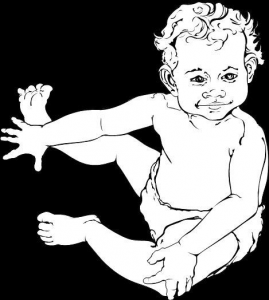I remember being in middle school and waiting for the bus. We’d run around, cluster in groups giggling and watch the boys throw a baseball. Now I see kids waiting for the bus standing still, heads down, phones out and texting instead of talking. I wonder when kids forgot how to play.
“Play is a child’s work” is a quote that is attributed to Maria Montessori and Jean Piaget. Both these experts worked in the area of child development and learning. They recognized that when children play, they actively engage in the world. Toddlers play when they drop a toy off their high chair. Is out of sight really out of mind? Will mom or dad pick it up? When they push or pull toys they learn what noise the toy makes and develop cause and effect concepts. Play helps children develop motor skills, learn colors and shapes.
During kindergarten and early school years, children play to build physical and intellectual abilities. Aerobic exercise, like riding bikes, running or swimming triggers the release of brain derived neurotropic factor. This factor works like fertilizer for your brain – so play helps kids learn better. Several years ago, I talked to a kindergarten teacher who told me her students are not allowed free play time. There must be observations, goals and evaluations.
With less play in and out of school, children may be more sedentary. Sitting all day may establish a sedentary habit. Expectations for continued learning and high achievement in all areas of life pushes children to believe that nothing is good enough unless it is outstanding. This stress can lead to higher levels of anxiety, self-criticism and depression if they do not achieve perfect or almost perfect performance. Without play, children have not learned the vocabulary to talk about their feelings and stresses. They have not learned coping skills to reduce emotional distress. They may cry easily, be irritable with parents, yelling or snapping at dad when he simply asks about homework being finished. Children may run to find escape in electronics, further escalating the problem.
Play therapy is an approach used with children, incorporating the natural means for a child to learn what they may be missing. Toys used are based on the age of the child. Some games may be directive –asking a child to take deep breaths or think of puffy clouds. Others will just focus on being able to take turns, win or lose with grace and congratulate the winner. Some therapy may develop intellectual or philosophical ideas with teens. Other therapy will focus on having the child develop trust in a non-judgmental, non-critical adult. Therapy can help children play through trauma and abuse, changing from fear of police coming when mom and dad argue to trusting that police can help stop problems. Playing through problems helps to solve them.
If you would like further information on the benefits of play or play therapy, call us at Specialized Therapy, Exceptional You or FX Med, 201-488-6678 or see our website at .
References
Counseling Children, John Bonordock, Continuum Publishers, 1991
Piaget’s Theory of Intellectual Development, Herbert Ginsberg & Sylvia Opper, Shorter & Hall, 1991
Spark, John Ratey, Little, Brown & Co., 2013


